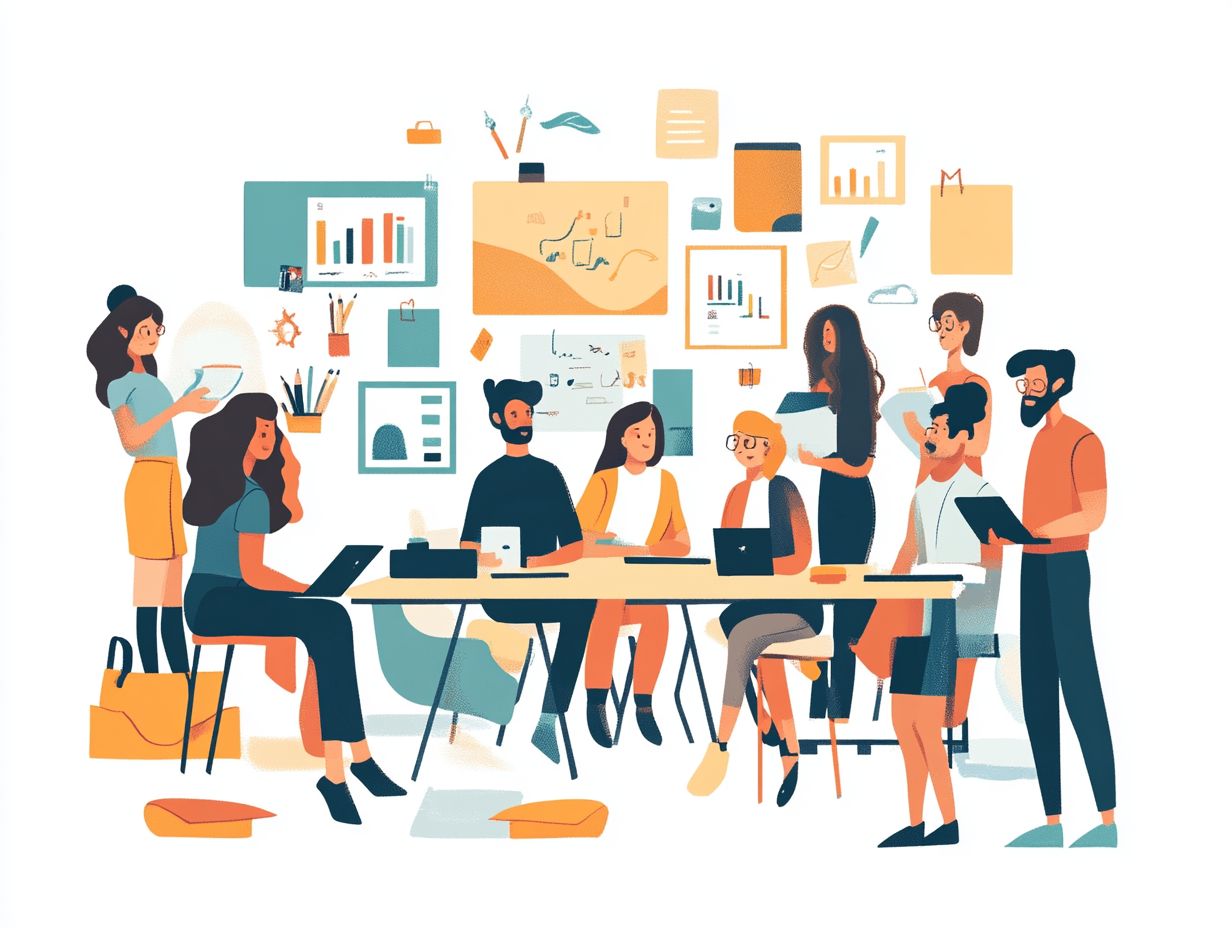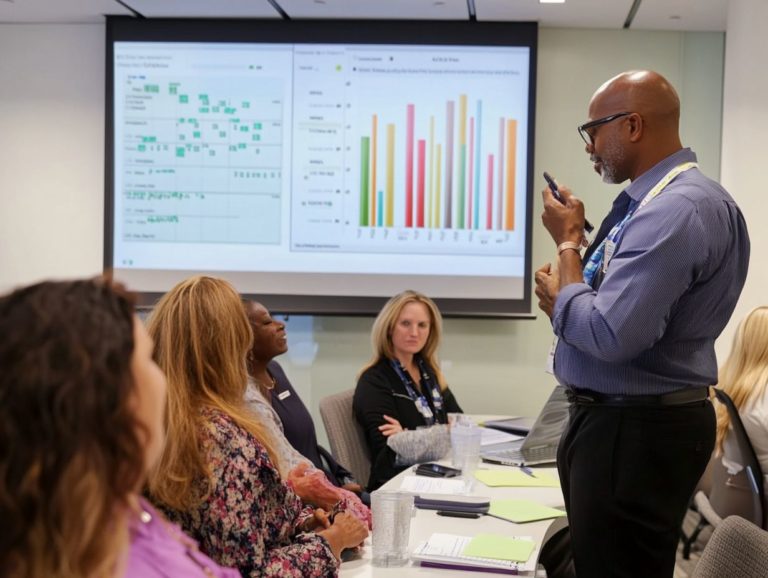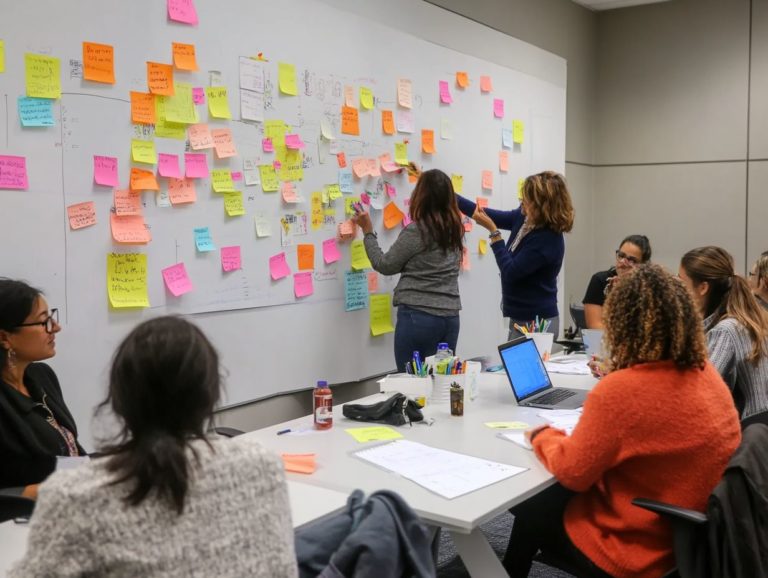5 Key Areas for Skill Enhancement Focus
In today s rapidly evolving job market, staying ahead requires more than just foundational knowledge; it demands a commitment to continuous improvement.
This article delves into five essential areas of skill enhancement: communication skills, time management, networking, creativity, and ongoing learning. You’ll discover why honing these skills is crucial, how to identify which areas require your attention, and effective strategies for personal growth.
We emphasize how employers can cultivate a culture of skill enhancement while addressing common challenges you may encounter along the way.
Embark on this journey with us as you unlock the path to professional excellence!
Contents
- Key Takeaways:
- 1. Communication Skills
- 2. Time Management
- 3. Networking and Relationship Building
- 4. Creativity and Innovation
- 5. Continuous Learning and Development
- Why Is Skill Enhancement Important in Today’s Job Market?
- Frequently Asked Questions
- What are the 5 key areas for skill enhancement focus?
- Why is leadership an important area for skill enhancement?
- How does improving communication skills benefit individuals?
- Why is problem-solving a crucial skill to develop?
- How does adaptability help in personal and professional growth?
- What makes time management an essential area for skill enhancement?
Key Takeaways:

- Strong communication skills are vital for career success and can be improved with practice.
- Time management boosts productivity and can be enhanced through prioritizing tasks.
- Networking opens up new professional opportunities and fosters collaboration.
1. Communication Skills
Communication skills are the bedrock of your workplace success. They encompass effective communication, active listening, and the ability to convey your ideas clearly. These elements are essential for fostering collaboration and enhancing teamwork within your organization.
Various types of communication, including verbal, non-verbal, and written forms, play pivotal roles. Verbal communication allows for immediate feedback, fostering lively discussions that propel projects forward. Non-verbal cues, like body language and facial expressions, often convey emotions that words can miss, making them crucial for effective messaging. Written communication serves as a permanent record and is vital for formal exchanges and documentation.
Emotional intelligence enriches your interactions within a team. Understanding your own emotions and those of others makes navigating social complexities easier. For instance, a customer service representative who listens empathetically can resolve conflicts more efficiently, leading to higher customer satisfaction and loyalty. This enhances your organization’s reputation and drives its success.
2. Time Management
Effective time management is essential for enhancing your productivity skills and achieving success in the workplace. It enables you to prioritize tasks, meet deadlines, and maintain flexibility in your schedule.
By adopting techniques like a method to prioritize tasks based on urgency and importance, you can easily focus on what matters most. The Pomodoro Technique encourages working in concentrated bursts followed by refreshing breaks, streamlining your workflow.
Setting SMART goals Specific, Measurable, Achievable, Relevant, and Time-bound provides clarity and direction for your tasks. Staying organized with digital planners or to-do lists helps track your progress effectively.
Ultimately, mastering these strategies not only boosts your productivity but also enhances your job satisfaction, allowing you to navigate your responsibilities with greater confidence and control.
3. Networking and Relationship Building
Networking and relationship-building are essential for your professional development, allowing you to forge connections that promote collaboration and elevate your role within the workplace.
Actively participating in both formal networking opportunities, such as industry conferences and workshops, as well as informal gatherings like casual meetups and social events, enhances your visibility and taps into valuable resources.
The connections you cultivate during these interactions can open doors to mentorship opportunities, facilitate knowledge sharing, and even lead to partnerships that significantly accelerate your career growth.
Maintaining strong relationships fosters trust and communication among colleagues and contributes to a supportive work environment where you feel valued and empowered to share your ideas.
Don’t wait to improve your skills start today!
4. Creativity and Innovation

Creativity and innovation are pivotal for your organization s progress, enabling you and your team to craft unique solutions and adapt seamlessly to shifting market demands.
By nurturing a culture that supports creative thinking, you enable your teams to explore unconventional ideas and challenge the status quo.
Think about how companies like Google and Apple have thrived by adopting practices like ‘20% time‘ and collaborative brainstorming sessions. These initiatives allow employees to dedicate part of their work hours to their passion projects, resulting in groundbreaking products and heightened employee morale.
When your teams feel secure in sharing their ideas and taking risks, you create an environment where problem-solving flourishes. This ultimately propels your organization toward greater success in an ever-competitive landscape.
5. Continuous Learning and Development
Continuous learning and development are crucial for you as an employee seeking to elevate your professional skills. They nurture adaptability and ensure you stay competitive in a fast-paced job market that s constantly being reshaped by technology and innovation.
In this context, setting personal and professional goals is crucial. It acts as a roadmap for your growth, motivating you to embrace new challenges along the way. By participating in diverse training programs whether online courses, workshops, or mentorship opportunities you can refine your expertise and maintain relevance in your field.
Organizations that promote lifelong learning not only develop a highly skilled workforce but also reap the rewards of enhanced productivity and innovation. This commitment to learning cultivates a culture of curiosity and resilience, enabling you to navigate the complexities of your career with confidence.
Why Is Skill Enhancement Important in Today’s Job Market?
Skill enhancement has taken center stage in today’s job market, enabling you to stay relevant and competitive. Here are 5 reasons to invest in skill enhancement, ultimately driving both your workplace success and your organization’s growth.
In a world where technology evolves at lightning speed, the importance of ongoing skill development is paramount. A 2021 study by the World Economic Forum reveals that nearly 50% of all employees will need reskilling by 2025 to align with market demands. Engaging in professional development opportunities can significantly boost your career prospects; research indicates that individuals who actively pursue these avenues are 75% more likely to advance in their careers, illustrating a clear link between career acceleration and skill enhancement.
As industries evolve with technological advancements, those who embrace continuous learning position themselves as invaluable assets to their organizations and emerge as leaders in their fields.
How Can One Identify Which Skills Need Improvement?
Identifying the skills you need to improve can be accomplished through performance reviews, self-assessment, and gathering feedback from colleagues, allowing you to set actionable goals for your professional development.
Self-awareness is crucial in this journey, as it encourages you to reflect on your strengths and weaknesses. For instance, utilizing assessment tools like 360-degree feedback surveys surveys that gather input from your peers, managers, and subordinates can provide valuable insights from various perspectives.
Online platforms like LinkedIn Learning can help you evaluate your existing skill sets and pinpoint relevant courses to enhance your expertise.
Regular check-ins with mentors create an environment of open dialogue, offering you opportunities for constructive criticism and guidance. By engaging in these practices, you gain a clearer understanding of your current standing in your career, paving the way for targeted skill enhancement.
What Are Some Effective Methods for Enhancing Skills?

There are numerous effective methods to enhance your skills, such as enrolling in training programs, attending workshops, and exploring 5 ways skill enhancement can transform your career through continuous learning initiatives focused on your professional development.
Online courses offer you flexibility and accessibility to learn at your own pace. Additionally, mentorship programs provide valuable insights from seasoned professionals in your field.
Engaging in peer collaboration further enriches your learning experience. It creates a supportive community where you can share ideas and challenges openly.
As industries evolve, your ability to adapt becomes increasingly crucial. By developing adaptability skills, which means the ability to adjust to new situations, you equip yourself to navigate changes efficiently.
How Can Employers Support Employee Skill Enhancement?
Employers play a pivotal role in nurturing employee skill enhancement by providing access to training programs, promoting continuous learning, and creating a workplace where feedback is valued.
To advance this objective, implementing targeted strategies can be highly effective. For instance, allocating a professional development budget allows employees to select courses or workshops that align with their career aspirations.
Establishing mentorship programs fosters a culture of guidance and shared knowledge. This significantly boosts morale. Regular performance reviews spark open conversations and help set clear goals, giving employees a clear trajectory for growth.
These initiatives boost individual skills and energize the entire workforce, ultimately leading to increased productivity and job satisfaction.
What Are the Benefits of Focusing on Skill Enhancement?
Focusing on skill enhancement offers a wealth of benefits, including improved productivity, greater job satisfaction, and a heightened chance of career advancement. For those interested in maximizing these benefits, consider these tips for effective skill enhancement communication, all contributing to your overall success in the workplace.
Investing in employee skill development fosters enhanced teamwork, enabling you and your colleagues to collaborate more effectively toward shared goals.
When your team members are equipped with updated skills, adaptability to change becomes a hallmark of your organization, allowing for seamless pivots in response to industry trends.
Consider the example of a leading software company that embraced a continuous learning program. This initiative led to swifter project turnarounds and increased client satisfaction, as the team became more adept at addressing customer concerns.
Organizations prioritizing skill enhancement not only boost their employees’ confidence and service capabilities but also pave the way for innovative approaches. This ultimately enhances overall performance and client engagement. Consider exploring 5 quick wins for skill enhancement in teams, as embracing this journey of skill development can truly elevate your professional experience.
What Are Some Common Obstacles to Skill Enhancement and How Can They Be Overcome?
Common obstacles to enhancing your skills often include limited time, a shortage of resources, and resistance to change. However, these challenges are not insurmountable; with strategic planning and a commitment to ongoing learning, you can tackle these challenges head-on!
By adopting effective time management strategies, you can carve out specific time slots dedicated to skill-building activities. This ensures that personal development remains a priority amidst your daily responsibilities.
Tapping into online resources such as industry webinars, instructional videos, or e-learning platforms provides you with valuable insights without demanding a significant time commitment.
Cultivating a growth mindset within your team encourages everyone to embrace change and view challenges as opportunities for improvement. This fosters an environment ripe for continuous learning.
By implementing these solutions, you can not only overcome barriers but also actively elevate your skill set.
Frequently Asked Questions

What are the 5 key areas for skill enhancement focus?
The five key areas for skill enhancement are leadership, communication, problem-solving, adaptability, and time management.
Why is leadership an important area for skill enhancement?
Leadership is vital because it helps individuals guide and motivate others toward a shared goal.
How does improving communication skills benefit individuals?
Improving communication skills helps individuals express their ideas clearly. It also fosters better relationships and conflict resolution.
Why is problem-solving a crucial skill to develop?
Problem-solving is essential because it helps individuals identify and tackle complex issues. This skill is valuable in many situations.
How does adaptability help in personal and professional growth?
Adaptability boosts personal and professional growth. It allows individuals to adjust to changes and thrive in new environments.
What makes time management an essential area for skill enhancement?
Time management is crucial. It helps individuals prioritize tasks, meet deadlines, and achieve goals effectively.






